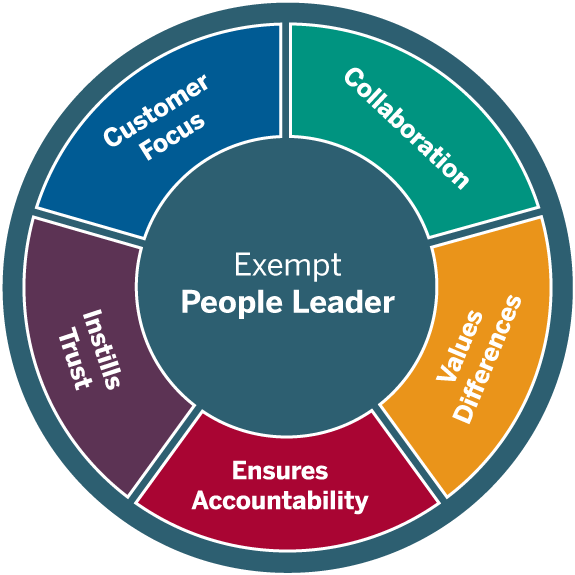Exempt People Leader: Operational
DIRECT WORKS
Providing direction, delegating, and removing obstacles to get work done
There is a major career transition point when a person need to shift from doing the work to getting the work done through others. It means giving up direct control over the work, which involves more risk. It also means a greater need to trust and equip others to get the work done, and a shift from personal achievement to enabling and empowering others. Leaders who succeed at this transition learn to set clear expectations, track progress, communicate the information people need to do their jobs, and successfully guide, delegate, and trust.
You show this competency when you:
- Provide clear direction and accountabilities
- Delegate and distribute assignments and decisions appropriately
- Monitor progress by maintaining dialogue on work and results
- Provide appropriate guidance and direction based on people’s capabilities
- Intervene as needed to remove obstacles
How to develop this competency:
Trust other people
Most people prefer to depend on themselves to get things done. You trust your own expertise. A belief that others can’t be trusted to deliver only leads to you hanging on to the work. You will end up with less time do what you need to do and they’ll have less opportunity to develop. Challenge the beliefs that get in the way of trusting others. Unsure of what to delegate? Ask people “What do I do that you could help me with?”
Give people freedom to perform
It’s important to strike a balance between keeping track of progress and constantly looking over someone’s shoulder. It’s OK and important to give people clear direction on what needs to be achieved and by when. But then step aside and give them freedom to perform. Invite them to figure out how to achieve the result in their own way. People are motivated when they can determine the “how” themselves.
Flex your approach
Different people need and want different levels of direction. You can judge what is appropriate by understanding their current levels of capability and confidence. First, there are those who are highly capable of doing the task and confident in their ability. Over direct these people and you will stifle them. Second, are those who are capable, but perhaps lack confidence in their ability-- provide support. Give a little more direction while encouraging them to come up with suggestions themselves. Third, are the people who are highly motivated to do a great job, but lack capability to do so independently. If you neglect to give these people direction, you set them up to fail. Talk to your team, find out what they need, then give it to them.
Learn more:
- Article: HBR, To Be a Great Leader, You have to Learn How to Delegate Well
- Article: HBR, 8 Ways Leaders Delegate Successfully
- Book: Deep and Deliberate Delegation: A New Art for Unleashing Talent and Winning Back Time by Dave Stitt
- LinkedIn Learning: Direct Works course collection

Exempt People Leader
- Direct Works
- Communicates Effectively
- Drives Engagement
- Manages Conflict
- Develops Talent
- Strategic Mindset
Operational
Sr. Operational
Strategic
